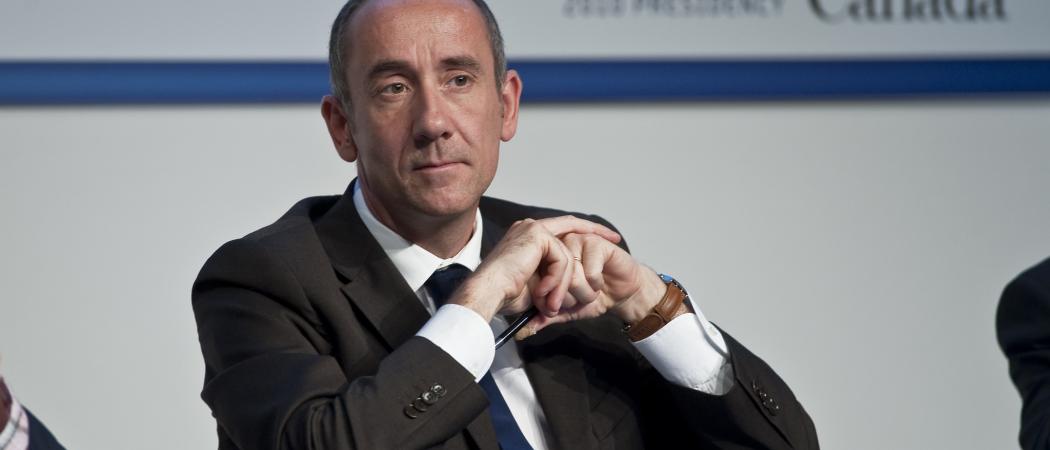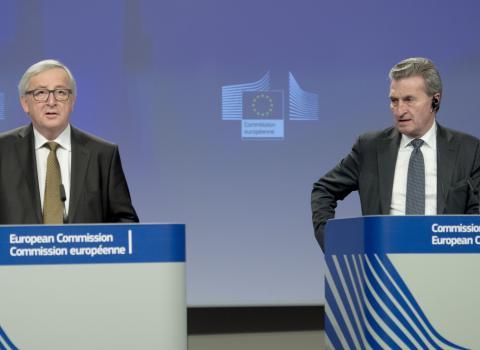'High-flying' civil servant Jean-Eric Paquet picked to replace Robert-Jan Smits, in move tying DG Research closer to central administration

Jean-Eric Paquet. Photo: International Transport Forum
Jean-Eric Paquet, a French national and career civil servant in Brussels, was named as the European Commission’s new director-general for research and innovation on Wednesday, as part of a wider reshuffling of senior management positions.
Paquet, currently a deputy in one of the most powerful offices in the bureaucracy, the secretariat-general, takes up his new role from April 1. The move – though a surprise to some – is viewed by Commission insiders as having the potential to consolidate ties between research and other policy areas, as the EU executive prepares its post-Brexit budget plans.
Paquet, who has been at the Commission in a variety of roles for 23 years, was one of five new directors general, and five new deputy directors general, chosen in a broad shakeup. He replaces Robert-Jan Smits, who has had an unusually long eight-year run at the helm of one of the Commission’s biggest departments.
Officials depict Paquet as a safe, trusted insider, with broad connections that go to the top of the Berlaymont, and proven administrative abilities.
“People respect him; he’s a high-flying civil servant who knows what he is talking about,” said Robert Madelin, former director general of DG Connect, who is now chairman and director of Fipra International, one of Brussels' largest consultancies. “Overall, it’s a very good appointment, and will be seen as particularly significant for the French.”
The new French administration, under president Emmanuel Macron, has been clear that France has much to gain from a bigger role in research and innovation.
Reassuring CV
Paquet’s CV reads like that of a seasoned Eurocrat, featuring a degree in international and public policies from the Robert Schuman University in Strasbourg, and a masters in European administration from the College of Europe in Bruges.
He joined the Commission in 1996, working in jobs including cabinet member for then German enlargement commissioner Günter Verheugen, and head of a delegation to Mauritania. From 2002 to 2004, he was deputy head of cabinet of research commissioner Philippe Busquin.
Marc Loher, a former adviser to the Commission, now CEO of a start-up, Innovation Loop, met Paquet when he worked for Busquin. “He was always eager to take initiatives and risks; a very intelligent person,” said Loher.
But inside DG Research news of Paquet’s appointment came as a surprise, and research lobbyists spent the afternoon googling his name.
Many are taking heart from his previous research policy work. “His CV is reassuring,” said Kurt Deketelaere, secretary-general of the League of European Research Universities.
In an email to R&D directorate staff sent less than one hour before the appointment was announced, research commissioner Carlos Moedas welcomed Paquet, saying he is, “A highly competent senior official, a talented manager and an experienced leader who comes with a longstanding experience in the Commission, including in the area of research and innovation.”
Moedas and his staff are known to have a good relationship with Paquet, having worked with him on a clean energy file in 2016. They foresee opportunities to use his ties in the secretariat-general to smooth the path of research proposals through the Brussels machine.
While it was expected Smits would be moving on, it was thought his successor would not be appointed until the summer, following publication of the post-2020 multiannual financial framework and the outline proposal for Framework Programme 9 (FP9).
Joining Paquet as his deputy will be Estonian Signe Ratso, who has 12 years’ experience in the European Commission's DG Trade.
Paquet will have the opportunity to reshape the directorate further through a possible reshuffling of internal responsibilities in the coming months, which could help consolidate or complicate the task of forging consensus on FP9 before a proposal is presented in May.
Other job moves saw new directors general appointed for climate action, education and employment.
Smits recognised
Smits, a respected figure among researchers, who oversaw a big increase in the EU research budget since he came into the job in 2010, will become a senior adviser to the Commission’s in-house think tank, the European Political Strategy Centre. His exact role is “still to be determined”, an EU statement said.
Before he leaves his current post, the Dutchman will have laid most of the groundwork for FP9. In the email to staff, Moedas said that Smits, “Has made an outstanding contribution to EU research and innovation policy over many years. He was one of the key architects of Horizon 2020 and has been instrumental to the ambitious agenda we are putting forward.”
Although the top tier of bureaucrats is expected to rotate every five years, Smits lasted eight. “He did a fantastic job; perhaps unmatchable,” said Deketelaere. “It cannot be stressed enough how much his contribution meant to a lot of people.”






 A unique international forum for public research organisations and companies to connect their external engagement with strategic interests around their R&D system.
A unique international forum for public research organisations and companies to connect their external engagement with strategic interests around their R&D system.